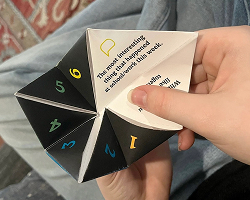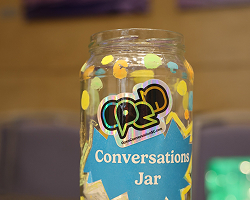 Background video for decorative purposes only
Background video for decorative purposes only
Talk with your kids about safe, healthy choices.

Break out the cocoa and start an open conversation.
Learn How to Have an Open Conversation
Open Conversation Tips: Experiences at School
Open Conversation Tips: Experiences at School
Open Conversation Tips: Talk When It's Comfortable
Open Conversation Tips: Why Open Conversations Matter
Open Conversation SC
Open Conversation SC: Alcohol
Open Conversation SC: Fentanyl
Open Conversation SC: Vaping
Open Conversation Tips: A Message for Nervous Parents
Open Conversation Tips: Create Social Outs
Open Conversation Tips: Four Conversation Starters
Open Conversation Tips: Listen Listen Listen
Open Conversation Tips: Start Talking Early
Activities & Resources
As a parent, you are your child’s biggest influence—so it’s important to have frequent, honest conversations about alcohol, tobacco and other drugs. If that sounds scary, try these tools to make it easier.

Conversation Catcher
Talking to your child is as easy as print, cut, and fold with this clever activity. Let fate choose what you talk about next.

Conversations Jar
Fill a jar with these conversation starters—and even add your own—so you always have something to talk about.

Backpack Conversations
Cut out these conversation starters and put one in your child’s backpack or lunch to encourage later talks.

Activity Placemats
Print, place and get them talking. These age-appropriate placemats are designed to make dinner table conversations easy and fun.

Tips for Talking to Your Kids
The Drug Enforcement Administration has developed five tip sheets that parents and other caregivers can use to talk with youth and young adults at different ages. They are based on content from Chapter 4 of the DEA’s publication Growing Up Drug Free: A Parent’s Guide to Substance Use Prevention, which the DEA jointly produced with the U.S. Department of Education.

Kids Will Ask Questions.
Be Prepared to Answer.
You can’t have a meaningful or impactful conversation with your children if you’re not ready with the facts. Use these sources to learn what you need to know to provide honest, accurate information and answer their questions.
Tips to Make Conversations Easier
In the News
Stay informed about what’s happening in the world so you can better understand what your kids are facing—and feel more confident starting important conversations at home.



